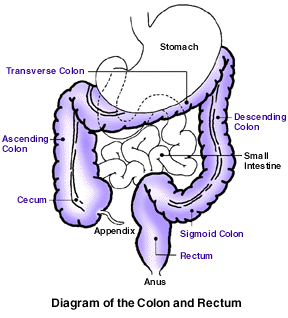|
|
||||||||||||||||
|
|
|
|
|
|||||||||||||
|
|
Control and Prevention Division of Cancer Prevention and Control 4770 Buford Hwy, NE MS K-64 Atlanta, GA 30341-3717 Call: 1 (800) CDC-INFO TTY: 1 (888) 232-6348 FAX: (770) 488-4760 E-mail: cdcinfo@cdc.gov Submit a Question Online |
|
|
|
Glossary
A Anus - The opening of the rectum to the outside of the body. C Cancer - A disease in which cells grow out of control. Cancer cells can invade nearby tissue and spread to other parts of the body. Colon - The long, coiled, tube-like organ (also known as large bowel or large intestine) that removes water from digested food. The remaining material, solid waste called "stool," moves through the colon and the rectum and leaves the body through the anus. Parts of the colon include: cecum, ascending colon, transverse colon, descending colon, and sigmoid colon. The average colon is approximately 6 feet long.  Colonoscope - A flexible, lighted instrument with a built-in tiny camera used to view the inside of the entire colon and rectum. Colonoscopy - An examination in which the doctor looks at the internal walls of the entire colon through a flexible, lighted instrument called a colonoscope. The doctor may collect samples of tissue or cells for closer examination. The doctor may also remove polyps during colonoscopy. Colorectal - Related to the colon, rectum, or both. D Double contrast barium enema - A series of x-rays of the colon and rectum. The x-rays are taken after the patient is given an enema, followed by an injection of air. The barium outlines the intestines on the x-rays, allowing many abnormal growths to be visible. F Fecal occult blood test - A test to check for hidden blood in stool. Fecal refers to stool. Occult means hidden. Sometimes called "F.O.B.T." (See also Stool Test). Flexible sigmoidoscopy - Also called proctosigmoidoscopy. A procedure in which the doctor looks inside the rectum and the lower portion of the colon (sigmoid colon) through a flexible, lighted tube called a sigmoidoscope. The doctor may collect samples of tissue or cells for closer examination and remove some polyps within view. G Gastroenterologist - A doctor who specializes in diagnosing and treating disorders of the digestive system (which includes the esophagus, stomach, pancreas, intestines, and liver). Gastrointestinal tract - The part of the digestive tract where the body processes food and eliminates waste. It includes the esophagus, stomach, liver, intestines, and rectum. I Intestine - The long, tube-shaped organ in the abdomen, also called the "bowel," that completes the process of digestion. There are both large and small intestines. P Polyp - An abnormal, often precancerous growth of tissue (colorectal polyps are growths of tissue inside the intestine).  R Rectum - The last 8 to 10 inches of the large intestine. The rectum stores solid waste until it leaves the body through the anus. S Screening test - Tests used to check, or screen, for disease when there are no symptoms. Screening tests for colorectal cancer include: fecal occult blood test, flexible sigmoidoscopy, colonoscopy, and double contrast barium enema. (When a test is performed to find out why symptoms exist, it is called a "diagnostic" test.) Sigmoidoscope - A flexible, lighted instrument with a built-in tiny camera that allows the doctor to view the lining of the rectum and lower portion of the colon. Stool - The waste matter discharged in a bowel movement; feces. Stool test - A test to check for hidden blood in the bowel movement (See also Fecal Occult Blood Test).
Page last reviewed: July 11, 2006
Page last updated: July 11, 2006 Content source: Division of Cancer Prevention and Control, National Center for Chronic Disease Prevention and Health Promotion |
|
||||||||||||||||||||||||||||||||||||||||||||||
|
|
|
||||||||||||
|